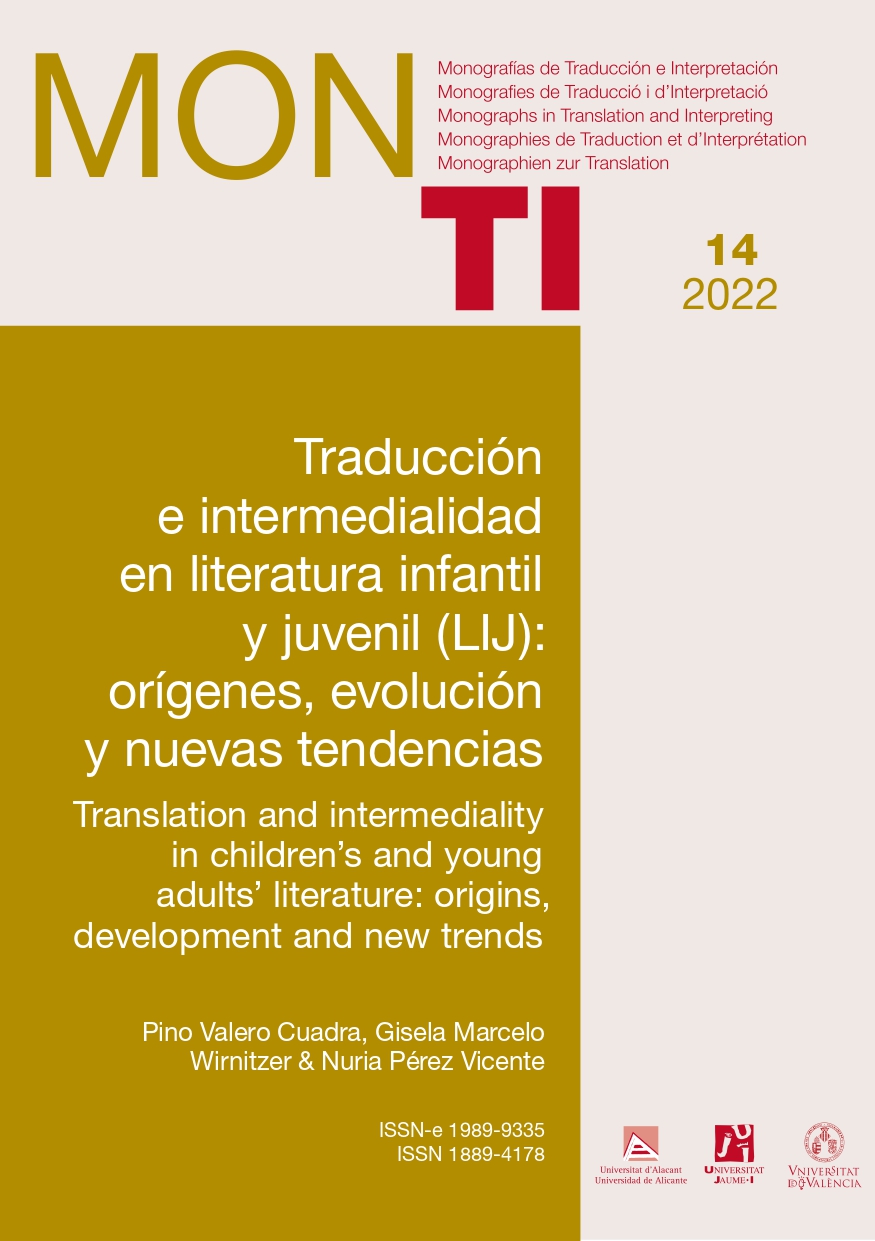The translation of ideological and didactic elements through Critical Discourse Analysis. The case of Five on a treasure is-land, by Enid Blyton (EN-FR-ES)
Main Article Content
Abstract
In this article, we study Enid Blyton’s Five on a treasure island by developing an analysis of the source text (in English) based upon Van Dijk’s Critical Discourse Analysis procedures in order to identify ideological, moralizing and didactic elements that may pose a challenge to children’s and young adults’ translators. Subsequently, we carry out a contrastive analysis of some of these elements on both the French and the Spanish versions of the book. Results will show that each target language uses two different translation procedures and also underline the convenience of Critical Discourse to stress out the didactic values of the book.
Downloads
Article Details
The documents contained in these directories are included by the contributing authors as a means to ensure timely dissemination of scholarly and technical work on a non-commercial basis. It is understood that all persons copying this information will adhere to the terms and constraints invoked by each author's copyright. These works may not be reposted without the explicit permission of the copyright holder.
References
DÍAZ ALARCÓN, Soledad. (2021) “Traducir literatura infantil: la singularidad del álbum ilustrado Charles, prisonnier du cyclope.” En: Veroz González, María Azahara & Pilar Castillo Bernal (eds.) 2021. Lenguas y traducción: retos y estudios de caso en entornos especializados y humanísticos. Madrid & Córdoba: McGraw Hill & Universidad de Córdoba, pp. 229 249.
DIXON, Bob. (1974) “The nice, the naughty and the nasty: the tiny world of Enid Blyton.” Children’s Literature in Education 5, pp. 43 65.
GAMAL, Sherine S. (2012) “El contexto cultural en la traducción de la LIJ: la adaptación Cuentos para contar de Naguib Mahfuz.” Hikma 11, pp. 113 132.
GAMBIER, Yves. (1992) “Adaptation: une ambiguïté à interro-ger.” Meta 37:3, pp. 421 425.
GAMBIER, Yves. (2002) “La retraduction, retour et détour.” Meta 39 :3, pp. 413 417.
GARCÍA DE TORO, Cristina. (2014). “Traducir literatura para niños: de la teoría a la práctica.” Trans 18, pp. 123 137.
GUIJARRO ARRIBAS, Delia. (2020) “Associative practices and translations in children’s book publishing. Co-editions in France and Spain.” En: Van Coillie, Jan & Jack McMartin (eds.) 2020. Children’s literature and translation. Texts and contexts. Leuven: Leuven University Press, pp. 93 110.
KÉRCHY, Anna. (2020) “The creative reinventions of nonsense and domesticating the implied child reader in Hungarian translations of Alice’s Adventures in Wonderland.” En: Van Coillie, Jan y Jack McMartin (eds.) 2020. Children’s literature and translation. Texts and contexts. Leuven: Leuven University Press, pp. 159 178.
MARCELO WIRNITZER, Gisela. (2007) Traducción de las referencias culturales en la literatura infantil y juvenil. Frankfurt: Peter Lang.
MEYER, Michael. (2003) “Entre la teoría, el método y la política: la ubicación de los enfoques relacionados con el ACD.” En: Wodak, Ruth & Michael Meyer (eds.) 2003. Métodos de análisis crítico del discurso. Barcelona: Gedisa, pp. 35-60.
NORD, Christiane. (2019) Traducir funciones. Manual de enseñanza y autoaprendizaje de la traducción. Santiago de Chile: Ediciones Universidad Católica de Chile.
OITTINEN, Riitta. (2000) Translating for children. New York: Garland Publishing.
PASCUA FEBLES, Isabel. (1998) “Contexto cultural en la traducción de cuentos infantiles”. En: Félix, Leandro & Emilio Ortega (eds.) 1998. Estudios sobre traducción e interpretación. Málaga: Universidad de Málaga, 567-573.
RODRÍGUEZ RODRÍGUEZ, Francisco. (2019) Cómic y traducción: preliminar teórico-práctico de una disciplina. Madrid: Sindéresis.
RODRÍGUEZ, Liliane. (1990). “Sous le signe de Mercure, la re-traduction.” Palimpsestes 4, pp. 63 80.
SIMMS, Karl (2006) Translating sensitive texts: linguistic aspects. Amsterdam: Rodopi.
VAN DIJK, Teun A. (1980) Texto y contexto. Semántica y pragmática del discurso. Madrid: Cátedra.
VAN DIJK, Teun. A. (1997). El discurso como estructura y proceso. Barcelona: Gedisa, 2003


